Brothers Egg: Bleeding Slow
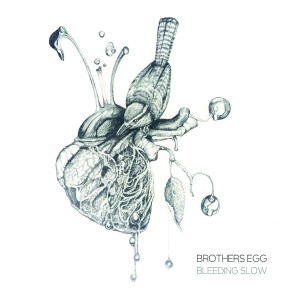 My first listen of Bleeding Slow came as I was racing across the Arizona desert on my way back to the east coast from a meandering road trip. The thoroughfare of I-40 stretches from California all the way to Wilmington, NC and I thought it appropriate to pop in some music from home as I picked up the road that would lead me back. Indeed, I experienced a blend of travel euphoria and homesickness as the sun set at my back, driving drum beats countered by sweet melodies, a collection of songs that serves as a love letter of sorts, expressed with a distinctly North Carolina twang.
My first listen of Bleeding Slow came as I was racing across the Arizona desert on my way back to the east coast from a meandering road trip. The thoroughfare of I-40 stretches from California all the way to Wilmington, NC and I thought it appropriate to pop in some music from home as I picked up the road that would lead me back. Indeed, I experienced a blend of travel euphoria and homesickness as the sun set at my back, driving drum beats countered by sweet melodies, a collection of songs that serves as a love letter of sorts, expressed with a distinctly North Carolina twang.
The core of Brothers Egg consists of brothers Jamie Eggleston (vocals, guitar, piano, banjo) and Hunter Eggleston (mandolin, vocals), and Suzanna Crist (violin, vocals). The three are joined by a cast of solid musicians, including their father Dave Eggleston on drums. Both Eggleston brothers began as drummers before leaning toward string instruments and expanding musical styles that lead to the founding of Brothers Egg.
The title track, “Bleeding Slow,” is probably my favorite track, featuring Hunter Eggleston’s steady mandolin riff weaving throughout, along with harmonica that sounds like a train whistle, driving bass, and banjo. Lead singer Jamie Eggleston delivers his lines with passionate urgency, assisted by some nice harmonies throughout. The instrumentation on “Bleeding Slow” is lush and as close to rock as one can come armed with mandolins and banjos.
“Moonbeat” highlights a catchy fiddle/mandolin melody and three part harmonies, with a lilting beat like ocean waves. The lyrics are based on a poem written by Jenny Eggleston, mother of the Eggleston brothers, who also did the album artwork.
“Dance With Me” is a sweet serenade that could be the first dance at a picture perfect North Carolina wedding. Jamie Eggleston’s voice is passionate even as he almost whispers some of the lines, sweet and earnest. The band’s musicianship really shows about halfway through, when violinist Suzanna Crist takes the lead and kicks the tempo into high gear with a full on bluegrass jam. If you aren’t convinced to dance by the five minute mark, you must really hate dancing. The song changes again at around the six minute mark, easing into 3/4 time. At first I thought it was the beginning of another song and I was a little bit disappointed that it wasn’t, because I would have loved to hear where that beautiful melody was going.
“After All”, the only song on which all three members of Brothers Egg share writing credits, addresses love within the context of mortality: “After all is said and done and washed away/We will fall back to mother earth from which we came.” The musical arrangement is a stark one, consisting only of two voices in harmony accompanied by guitar and violin. The stripped down nature really allows emotions to shine through, showing that sometimes simplicity is the right choice.
The band moves into a more creative and experimental space on “Dreamer,” which alternates between a dreamscape feel on the verses and a rockabilly groove on the choruses. Andy Blair steps in for some nice guitar licks, adding a different texture to the song without being overbearing.
“Take a Chance on Me” is straightforward, simple, and sweet, a heartfelt plea to convince a woman to take a chance on the “wild card,” a sort of bluegrass version of the Spin Doctors’ “Two Princes.” There is a great fiddle solo after the bridge, and a bonus banjo jam at the end by local folk/bluegrass legend Big Al Hall.
The final track on the album feels very much like a group of friends hanging out in a living room having fun and playing music, complete with a “1,2,3!” lead-in, a typically bluegrass bass line, a hoot/holler or two, and some call and answer harmonies. “Carolina Wren” is a short song, based on another Jenny Eggleston poem. The music itself ends abruptly just after the two-minute mark, and the CD ends with almost a full thirty seconds of an actual wren singing, which I appreciate as a nature lover as well as a lover of unconventional album endings.
Bleeding Slow is solid folk with some well-done creative embellishments, a showcase for Brothers Egg’s musical talent and ambitions, and a suitable choice for a Carolina-bound roadtrip. Learn more about Brothers Egg and get a copy of Bleeding Slow at https://brothersegg.bandcamp.com/album/bleeding-slow.
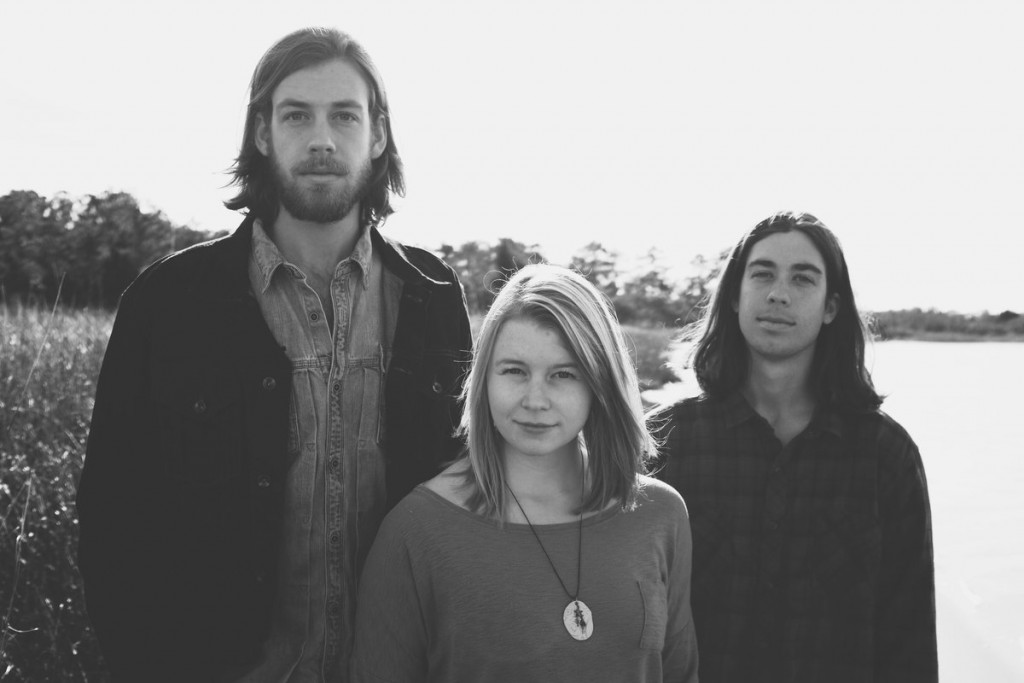
Vanessa Lynch: Walking Blind
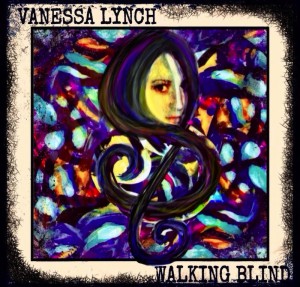 Vanessa Lynch has been circling the spotlight for a few years now, surrounded by and performing with some of Wilmington’s brightest talents, while remaining somewhat under the radar. Until now. Lynch’s debut album Walking Blind is thoughtful, deliberate, and musically rich. Credit is due to her band, all accomplished musicians in their own right, who weave a rich tapestry around Lynch’s voice without overpowering her. Also noteworthy is the overall positive message, a theme of rising above adversity using the fuel of inner strength. Musically, most of the songs harken back to an earlier time, putting a modern spin on funk-spun soul.
Vanessa Lynch has been circling the spotlight for a few years now, surrounded by and performing with some of Wilmington’s brightest talents, while remaining somewhat under the radar. Until now. Lynch’s debut album Walking Blind is thoughtful, deliberate, and musically rich. Credit is due to her band, all accomplished musicians in their own right, who weave a rich tapestry around Lynch’s voice without overpowering her. Also noteworthy is the overall positive message, a theme of rising above adversity using the fuel of inner strength. Musically, most of the songs harken back to an earlier time, putting a modern spin on funk-spun soul.
The album opens with title track “Walking Blind.” The instrumentation is gorgeous, right from Luke Wilson’s first drum beat into Nicole Mancini’s violin intro. The song itself is catchy and Lynch’s voice is emotional but controlled, a task she makes seem easier than it is. The pop soul melody sets a nice tone for the rest of the album.
“Butterfly” starts with a slow jazz guitar riff from Michael Buckley and builds into chromatics that actually simulate the idea of flying. Lynch’s voice soars and benefits from backing vocals that invoke vintage girl groups like The Supremes. The butterfly imagery is effective in describing a relationship that continues to pull her back in, even as she pleads, “Give me the nerve to fly.”
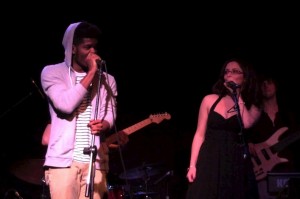
It’s probably appropriate that an album emphasizing self-worth and being true to yourself would follow an easy breezy song with the immediate sound of a rap verse. “Courage” works because the lyrical rhymes of Danny “Louis.” Thomas bring out the hip hop leanings in Lynch’s voice. The lyrics are a simple but effective homage to self-sabotage: “Courage won’t enter me and I know why, ’cause I won’t let it.”
“Glow” is the song that should appear in whatever happens to be the next girl power movie of the year, meaning that this is what young girls (or women, or really ANYONE) should be singing along to. “Girl, get your shine on…let your inner beauty show, and glow.” It doesn’t hurt that the song itself showcases some beautiful vocals, including some fantastic backing harmonies.
Lynch gives a nod to her adopted home in “Carolina.” The song is the most folky-sounding song on the album, an appropriate vehicle for ruminating on how moving to the south has changed her. As a fellow Yankee transplant, I can definitely relate to her lyrics expressing heartfelt love for her new home. “North Carolina has given so much to me,” indeed.
“My Flower” is adventurous musically in a way that seems to really bring out the rich emotion in Lynch’s voice, even as she navigates back and forth across a (very effective) time change. She flexes creatively on this song and her band follows suit. The motown sound throughout segues into a guitar solo at the end that downright blazes.
The ballad “Two Men” is so rife with sadness that the feeling of loss is palpable right from the beginning, thanks to a stirring piano intro by Dylan Linehan aided by some emotional violin playing from Mancini. When Lynch’s voice finally does float above the instruments, she allows herself to be vulnerable singing, “I’ve been told I’m a pillar of strength/ Well they don’t see me when I’m all alone.”
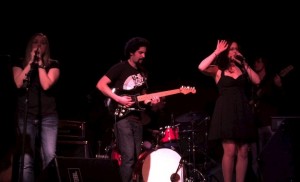
Nothing pulls a listener out of a sad funk like…funk. And the next two songs are downright funky. “Strange & New” has a beat and a bass line that, combined with Lynch’s outstanding vocals and harmonies, perfectly capture the lustful fun of a new love affair. The chorus really makes me want to dance, and there is a killer bass solo from Taylor Lee. “How Dare You” continues the dance trend while also revisiting the theme of empowerment. Lynch’s voice is powerful and full of feeling as she repeats the line “How dare you,” folding herself into what sounds like an old-school soul jam. Buckley swoops in at the end and delivers an exceptional guitar solo.
Lynch smartly ends on an upbeat note, but one that also showcases her creativity. “Shouldn’t Let Me Go” starts out on an upbeat note and then takes a turn into a dark and spooky bridge in the middle. Just when I think I’m going to get sucked into the piano-and-violin-heavy scary dark place, the sunny guitar and vocals rescue me and place me gently back into pop bliss. The song is catchy lyrically and melodically, and is a great finish to what is a strong debut album.
Vanessa Lynch has delivered some great music that is very much its own sound, a rarity in today’s over-homogenized market. After being up-and-coming for the past few years, Lynch has shown that she’s ready to arrive. Vanessa Lynch doesn’t just shine, she glows.
Walking Blind is available online on iTunes, Amazon, and all other major digital retailers, as well as locally in Wilmington, NC at Gravity Records and Steele Music Studios. You can keep up with Vanessa Lynch online at http://www.reverbnation.com/vanessalynch and https://www.facebook.com/vanessalynchmusic.
Jude Eden: In the Key of J
This Saturday, January 10th, is the much-anticipated release of cellist Jude Eden’s debut album In the Key of J. She will be performing live at Fermental at 7pm, at which time you can also pick up a copy of the album. For more details, check out the Facebook event.
Best known locally for being half of the duo Upstarts and Rogues (we talked about them in KFR Live #8), this is Eden’s first solo recording effort. The songs are mostly instrumental, usually with melodies layered over rhythmic plucking. The beauty of songs without lyrics is that the listener is free to go wherever she or he chooses, to interpret the music based on the emotion it invokes, with no verbal guidelines from the creator. I recommend listening to this album when you have time to let your mind wander and go on an adventure, undistracted by the “real” world.
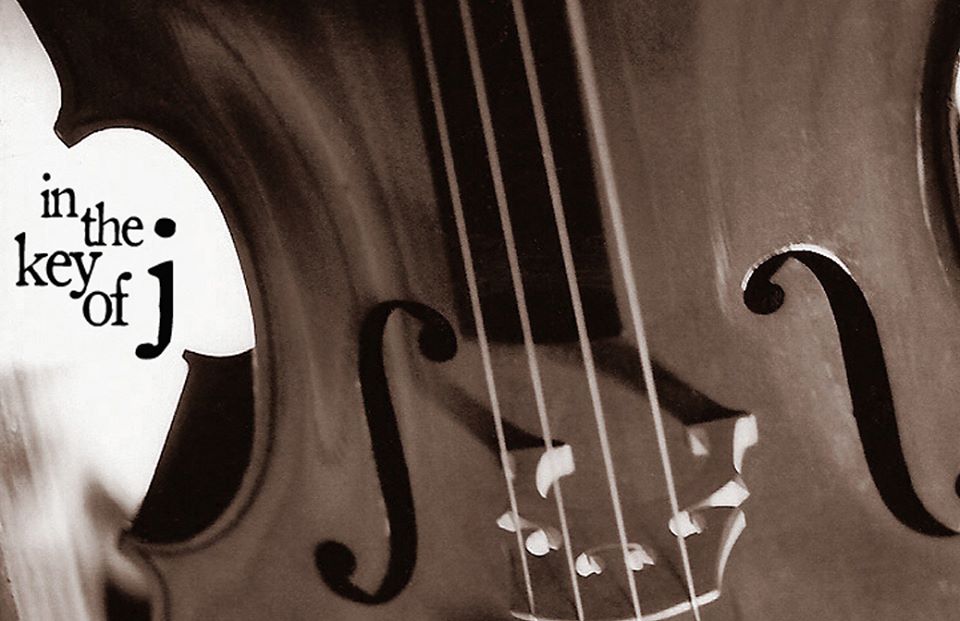 In the Key of J opens with “Cascades,” a good introduction to Eden’s style of sonorous melody layered over percussive plucking. The second track, “Spy vs. Spy,” might be my personal favorite. Eden cleverly utilizes her instrument for a variety of effects, from resonating knocks to sneaky slides in and out of some of the notes. I really got a sense of mystery, tiptoeing around, the possibility of danger. “Morning Glory” stands out as the brightest and most cheerful song on a largely brooding album, invoking images of gardens, meadows, and the fresh dew of a new day. “Faye’s Voyage” is another example of great effects, including some nice scratching noises. There’s a sense of symmetry, with effects at the beginning and the end, and dual melodies interlacing throughout the body of the song. I sort of felt like I was on a boat, which made the segue into “Whales” make a lot of sense. The plucking fades in and out like the pulsing of sonar, with a strong and smooth melody layered nicely over it. Eden gives this song space to breathe, with an easy melody that doesn’t feel forced to cover too much ground. “Witness” is a short and sinister-sounding track with no background plucking, implying a singular voice carrying a lot of emotion and possibly some trauma.
In the Key of J opens with “Cascades,” a good introduction to Eden’s style of sonorous melody layered over percussive plucking. The second track, “Spy vs. Spy,” might be my personal favorite. Eden cleverly utilizes her instrument for a variety of effects, from resonating knocks to sneaky slides in and out of some of the notes. I really got a sense of mystery, tiptoeing around, the possibility of danger. “Morning Glory” stands out as the brightest and most cheerful song on a largely brooding album, invoking images of gardens, meadows, and the fresh dew of a new day. “Faye’s Voyage” is another example of great effects, including some nice scratching noises. There’s a sense of symmetry, with effects at the beginning and the end, and dual melodies interlacing throughout the body of the song. I sort of felt like I was on a boat, which made the segue into “Whales” make a lot of sense. The plucking fades in and out like the pulsing of sonar, with a strong and smooth melody layered nicely over it. Eden gives this song space to breathe, with an easy melody that doesn’t feel forced to cover too much ground. “Witness” is a short and sinister-sounding track with no background plucking, implying a singular voice carrying a lot of emotion and possibly some trauma.
I suppose “Canon” might technically be considered to be a cover song, since it is based on Pachelbel’s “Canon in D.” However, Eden gets a ton of points for creativity. I expected multiple layers of cello, which is what happens eventually. Totally unexpected was Eden’s sultry yet understated voice added into the mix, the only time she actually sings on the album. Her two instruments are layered like a musical lasagna: Cello, cello, vocals, vocals, cello, vocals, etc. The breathy vocal harmonies interwoven with the cello melodies really make this arrangement different from any heard before. By the time the song reaches its crescendo, the effect is that of a choir of singers on one side and a choir of cellos on the other. The wild ride wraps up with a solitary cello. You’ve heard this song before but you haven’t heard THIS song before.
“La Ramblas” sounds like the soundtrack to someone getting ready for a duel or a mission or at least walking down the street meaningfully, possibly on a hot day. “Something in the Way” is a brooding interlude that marches deliberately. In “The Seafarer” Eden uses reverb and delay to make the cello actually sound like water. When the dual high and low melodies kick in, I do feel like I’m on a journey on the sea.
The album ends with a cacophonous head trip of a song called “Catalyst.” This is the only other time Eden’s voice appears on the album, this time with spoken word. I’ve always enjoyed her lyrical freestyles performed live and don’t think a Jude Eden album would be complete without showing off her poetic prowess. There is so much going on in this song that I had a hard time deciding what to listen to. On the one hand, there is a whole toolbox of cello effects, from the sound of dripping water to a traffic jam of beautiful noise. And on the other hand there is Eden’s voice, both ominous and playful, echoing amid the futuristic orchestra. Among the lyrical gems are lines such as “Darkness is the catalyst for my creative catharsis.” The line she repeats as the song and album comes to a close could be a tagline for the album itself: “A new way into the same old day.”
Pick up a copy of In the Key of J at Eden’s live show or order online at inthekeyofj.com.
Stray Local: Debut EP Review
Stray Local, the amazing three-piece featured in a recent KFR show review, just released their debut EP. We got our hands on a copy in anticipation of their official CD release show this coming weekend at Ted’s in Wilmington.
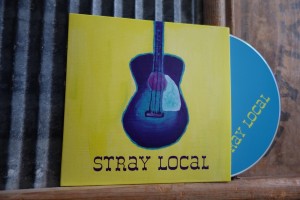 The artwork is light, featuring a blue acoustic guitar on the front and a purple mandolin on the back, both placed on a bright yellow background with very little text. These two instruments are actually beautiful paintings by vocalist Hannah Lomas, similar to paintings and handmade artwork displayed at shows. The design is simple and captures the band’s unassuming vibe.
The artwork is light, featuring a blue acoustic guitar on the front and a purple mandolin on the back, both placed on a bright yellow background with very little text. These two instruments are actually beautiful paintings by vocalist Hannah Lomas, similar to paintings and handmade artwork displayed at shows. The design is simple and captures the band’s unassuming vibe.
The EP itself is very much a representation of what the band sounds like live – polished, no frills, unadulterated folk music that isn’t buried under effects. So often a band releases a recording that does not do them justice, and we were relieved that this very much wasn’t the case with Stray Local. The music comes across as a slightly cleaner version of what is already an excellent live performance, stripped of background noise but not of the organic energy of the songs themselves. It is a credit to both the band and audio engineer Jeff Reid for recognizing what the band does well and not ruining it with studio bells and whistles.
The six songs included on the EP represent the band well. “Invisible Man” is the upbeat leading number, featuring guitar, mandolin, percussion, and harmonies in the traditional bluegrass style. It’s a rousing number about a rambler, “in his own town but never at home…the one you ignore as he walks past your door.” Vocalists Hannah Lomas and Jamie Rowen harmonize throughout, including an a cappella chorus, while percussionist Nick Simon keeps perfect time on the snare and tambourine.
“Pretty Little Setback” describes a tempting yet toxic relationship featuring strong and sassy vocals from Lomas, killer blues guitar riffs from Rowen, and a funky beat on the cajon from Simon. It’s here that we get to hear some of the intricacies in the instrumentation that are often lost in a loud music venue. In fact, we lamented that there was not an extended jam with some hot blues guitar from Rowen and some vocal jazz riffs from Lomas, with perhaps even a cajon solo thrown in at the end. When something sounds this good, two short minutes just isn’t enough.
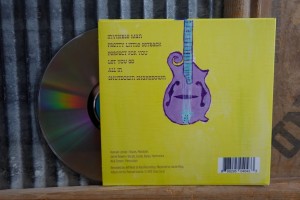 “Perfect for You” is a lilting mid-tempo number that speaks of an unrequited crush and sounds sweet and tender, despite the fact that Lomas laments, “Why don’t you see me, I’m standing right here?” Rowen’s backing vocals are gentle and show off his higher range. He also contributes a solid harmonica solo halfway through the song. Lomas shows the ease of her vocal control here as well, while Nick Simon carries the song with a clean brushed beat on the bassy cajon.
“Perfect for You” is a lilting mid-tempo number that speaks of an unrequited crush and sounds sweet and tender, despite the fact that Lomas laments, “Why don’t you see me, I’m standing right here?” Rowen’s backing vocals are gentle and show off his higher range. He also contributes a solid harmonica solo halfway through the song. Lomas shows the ease of her vocal control here as well, while Nick Simon carries the song with a clean brushed beat on the bassy cajon.
The EP continues on in the gentle vein with a wrenching ballad called “Let You Go,” another number that shines in subtlety on the recording. The balance between Lomas’ and Rowen’s voices is absolutely perfect and they both expertly convey an air of soul-crushing heartbreak. It’s the most somber of love songs, both believable and beautiful, with lines like “You gave yourself so honestly and always loved wholeheartedly…If I could let you go, my dreams would be empty.” If people still made break-up mixtapes, this song would be on it.
Luckily, the tears dry fast once the band launches into “All In,” a fun foot stomping love/gambling analogy. Although the song comes across a bit less raucous on recording than it does live (as it should), it’s still an incredibly fun song that will get stuck in your head. Listen to it and try not to find yourself tapping your foot and singing the catchy chorus to yourself afterward, “Go all in, I’ll double down, I’ll wager something high, you’re the girl I’ve been waiting for, I’ll be with ’til I die.” We dare you.
“Shutdown Shakedown” is a good ol’ fashioned banjo, mandolin, harmonica, and washboard instrumental that is the perfect closer for this well-rounded EP. Stray Local is a band that plays their instruments well and knows exactly who they are. Their debut is well done all across the board and we can’t wait to see what they deliver next.
Stray Local is holding their CD Release Party in conjunction with the Third Birthday Celebration for beloved acoustic music haven Ted’s Fun on the River on Saturday, February 1st from 7-9pm. Check out the Facebook event here.
Dylan Linehan: Pericardium
Any fan of live music knows what it’s like to see a good show – not just a “cool, that was worth my 5 bucks at the door” kind of show, but a truly goosebump-inducing blow your mind kind of show. It’s the kind of show that keeps you up at night reliving it and sits fresh in your mind the next day. One of these shows for us was the first time we heard Dylan Linehan and her magnificent piano (click here for our review of that show). She’s continued to perform since then, and is now releasing her debut album, Pericardium, featured in our Karmic Fury Records album review series.
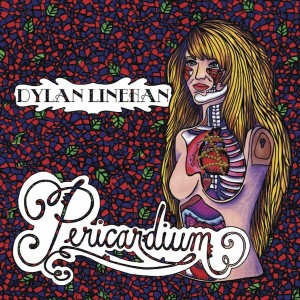
Pericardium is best viewed as a companion piece to Linehan’s live performance. The album is beautiful yet restrained. In order to appreciate the work that went into capturing her emotional energy in a medium like this, like a great Broadway musical, you really must really see and hear the live performance. The Broadway musical analogy is especially apropo, as Pericardium sounds like the soundtrack for a theatrical production. Linehan has scored student films and is also working on the score for a feature film with her father, Terry, and this sense of an underlying story is apparent on the album.
Pericardium opens with a thundering piano leading into “Tazmanian White”, a different kind of love song about a free spirit. The dramatic chorus will get stuck in your head, as it’s been in ours since we popped in the CD several days ago. The drums and well-placed backing vocals really flesh out the arrangement, which is pushed along by strong piano riffs throughout. Linehan’s vocals sound a little bit thinner than we’re accustomed to, one of the unfortunate side effects of studio compression, but the emotion shines through, especially when she really unleashes near the end against a backdrop of piano, electric guitar, and shouted background vocals. One part in particular reminds us of Kate Bush.
A hauntingly beautiful 25 second vocal interlude segues into our personal favorite track on the album “For Us”, which is probably also the song most likely to appeal to the mainstream sector. From beginning to end, the arrangement is breathtaking, with percussive, yet soft strings adding a lightness throughout the song that perfectly accompanies Linehan’s sweet vocals. The light pop song is simple and delicate and could easily make its way onto a movie soundtrack. By the time the song ends in a decrescendo of vocal harmonies and strings, we’re completely enamored. We can’t get enough of this song.
“Oh Fixation, Please Fix Me” starts off in a similar vein, before launching into a full out rock opera in the chorus, complete with passionate backing vocals and electric guitars. The lyrics pack a punch too, with lines such as “You won’t remember me, I’m just a happy memory for someone else to find.” Linehan keeps her verses sweet and subtle and then exudes force and fury in the choruses, her technical and emotional ranges both apparent as she addresses addiction. There is some nice electric guitar work in this one as well – the riffs are clean and effective without being too much, in addition to some more excellent string work.
The next song, “Fireside”, begins with a piano riff and big chorusy vocals that remind us of one of the more tender moments of a Tim Burton movie. Even at its sweetest, the song has an undertone of dark drama. In the bridge/chorus, a beautiful low cello helps escalate the song into a more upbeat but no less sweet apex before tapering off into an absolutely lovely and soft conclusion. “Forever I’m yours, and you’re mine”, indeed.
We have hardly a moment to recover before being launched into a slow cello solo that sounds downright sinister. Not exactly what one would expect from a song called “BFF”, the bitterness oozes out of every note in the first few slow lines before launching into full rock opera territory with help from more guitar and drums. She really lets loose on the vocals, too. “You could have treated me right…Is this what you wanted? You wanted a fight? Well now you got what you had comin’!” Zing.
At this point, the album shifts away from full band arrangements to more bare bones instrumentation, where it stays through the remaining songs. When we asked her about this transition, Linehan answered that it was indeed a deliberate decision intended to strip away the layers in order to get to the origins of it all, the “music within the music”. With only her voice, piano, and occasional subtle strings, “Carry On” is a tender testament of Linehan’s attention to emotional nuance. The perfectly executed vocal phrasing, sometimes almost a whisper and then rising to a plea and back again, is extremely effective. While Linehan sounds great with the band, she knows when to let the music speak for itself without any frills.
“Another Day Like Sunday” is another piano/vocal showcase with some nice theatrical lines that are almost playful and sing-songy if not for the underlying cynicism. She plays some great classical/theatrical piano in this song. By the final refrain, the song becomes a funeral dirge and the heartache in Linehan’s voice is apparent.
Luckily, we’re rescued from despair with the sweet sounding “Coupon Book” about the excitement and trepidation of a new love. Even here, however, Linehan and her piano don’t rest easy. “I could give you a coupon book for all the things I’d do for you, But we both know I only give favors on paper, It’s only ink in navy blue,” she whispers as the song winds down.
The album concludes with the funhouse carnival piano masterpiece that is “Medusa’s Zen Garden”. Over seven minutes in length, the piano work in this song is downright impressive. She also has some nice expressive vocals that escalate into what we can best describe as a “whoop”. The parts where she speaks the words in between echoing vocals make us feel like we’re at the crucial conclusion of an epic theatrical masterpiece. The urgency in both vocals and piano is apparent and effective. The lines, “I am not the girl I used to be. There’s a cage around my heart, you’ll never find the key!” are a fitting end to the album as a whole.
Pericardium is by definition a tough double layered membrane which covers the heart. This is the metaphor that ties all of the album’s songs together as Linehan allows her questions, emotions, stories, and music to flow through punctured holes in her pericardium. In her own words she explains: “In every song, there is the challenge of breaking through a wall, posing the questions of how we use our bodies as the ‘pericardiums’ for our souls. How do we hide our pain? How do we cope? How do we thrive and break down our walls of fear? Why do we build our walls to begin with, and what are they made of?” With her unique and theatrical style, Linehan can’t help but pierce through the pericardium of each listener. By the conclusion of the album, beware, for your heart may lay open and exposed.
For more information about Dylan Linehan, visit her website at: http://dylanlinehan.com
Musicians on Pericardium include:
Dylan Linehan: vocals and piano
David Easton: acoustic guitar, electric guitar, bass guitar
Joe Ristaino: drums
Lizz Gay: viola
Hillary Flowers: cello
Preston Luce: cello on “Carry On”
Lydia Meadows: violin
Vanessa Lynch: backing vocals
Dylan Fowler: backing vocals
